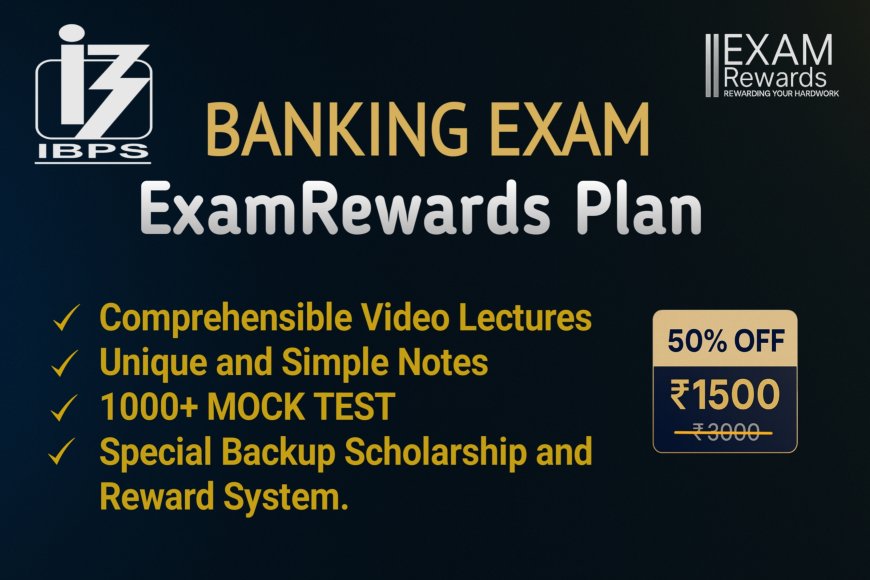SBI Probationary Officer (PO) Exam
Video Lectures Notes Mock Tests

SBI Probationary Officer (PO) Examination
TABLE OF CONTENT
1. OVERVIEW
2. ABOUT EXAM
3. NUMBER OF VACANCIES
4. ELIGIBITY
5. HOW TO FILL EXAM FORM
6. SELECTION PROCESS
7. SYLLABUS
8. TIPS FOR COMPREHENSIVE PREPARATION
Overview
|
Exam Name |
SBI Probationary Officer (PO) Examination |
|
Number of vacancies |
To be notified |
|
Education Qualifications |
Bachelor’s Degree from any recognized University |
|
Age limit |
21 years to 30 years |
|
Registration Date |
TO BE ANNOUNCED |
|
Mode of Application |
Online |
|
Mode of Exam |
Online |
|
Official Notification PDF |
to be released |
|
Application Link |
Coming soon |
|
Admit card Link |
Coming soon |
|
Result Link |
Coming soon |
|
Official website |
ABOUT EXAM-
Each year, numerous ambitious individuals aspire to excel in the renowned State Bank of India (SBI) Probationary Officer (PO) examination, which serves as a gateway to a lucrative career within the banking sector. This esteemed banking examination, being among the most coveted in India, offers a mixture of challenges and opportunities, making it an alluring path to engage with the vibrant realms of banking and finance. In this article, we will intricately explore the nuances of the SBI PO exam, encompassing its distinct examination pattern, comprehensive syllabus, effective preparation strategies, and a guided route to triumph. for more information read full article presented by examrewards.com
APPLICATION FEE:
General/Economically Weaker Section (EWS)/Other Backward Classes (OBC): The application fee for candidates falling under these categories typically ranges from INR 750 to INR 850.
Scheduled Castes (SC)/Scheduled Tribes (ST)/Persons with Disabilities (PWD): Candidates belonging to these categories usually have a lower application fee, which can range from INR 0 to INR 125.
Eligibility
Nationality:
You must be an Indian citizen.
Age Limit:
As of a specific date mentioned in the official notification, you should be between 21 and 30 years old. Age relaxations are applicable for candidates belonging to reserved categories:
Scheduled Castes (SC) and Scheduled Tribes (ST): Up to 5 years of relaxation.
Other Backward Classes (OBC): Up to 3 years of relaxation.
Persons with Disabilities (PWD): PWD (SC/ST) candidates get up to 15 years of relaxation, PWD (OBC) candidates get up to 13 years, and PWD (General) candidates get up to 10 years.
Educational Qualifications:
You should possess a Bachelor's degree in any discipline from a recognized university or any equivalent qualification recognized by the Central Government. If you are in your final year/semester of graduation, you can also apply, but you will need to provide proof of passing before a specified date.
Number of Attempts:
The number of attempts varies based on the category you belong to:
General/EWS: Maximum of 4 attempts.
OBC: Maximum of 7 attempts.
SC/ST/PWD (General/EWS/OBC): No specific limit.
Other Requirements:
You must not have a record of defaulting in loan repayment/credit card dues.
You must not have any adverse reports in the CIBIL database (or similar entities).
Please note that these eligibility criteria are generally applicable, but it's essential to check the official notification for the specific year you plan to apply. Criteria might change from year to year, and the official notification is the most accurate source of information.
Eligibility Tips:
· Thoroughly Read the Notification: Make sure to read and understand the eligibility criteria mentioned in the official SBI PO examination notification.
· Keep Documentation Ready: If you're in the final year of your graduation, ensure you have the necessary documents to prove your passing before the required date.
· Check Relaxations: Be aware of the age relaxations and attempt limits based on your category.
· Verify Other Requirements: Ensure you meet the other requirements related to loan defaults and credit history.
How to Fill Application Form
STEP 1: Visit official website https://sbi.co.in/web/careers/probationary-officers
STEP 2: On website click on “Apply Online”
STEP 3: Fill the details as required
STEP 4: upload scanned copies of photo, signature, identity proof and other document as per the required format and size mentioned in the instruction
STEP 5: Check details once again
STEP 6: Pay the application fees
STEP 7: Submit the form the note down and save the registration number/Roll number.
Examination: Step-by-Step Exam Pattern
Step 1: Preliminary Examination
1. Test Sections: The preliminary examination consists of three sections:
English Language
Quantitative Aptitude
Reasoning Ability
2. Total Marks and Time: The preliminary exam is for 100 marks in total, with each section usually carrying 20, 35, and 35 marks respectively. You typically have 20 minutes for the English Language section and 20 minutes each for the Quantitative Aptitude and Reasoning Ability sections.
3. Question Types: Multiple-choice questions (MCQs) are prevalent in the preliminary examination.
4. Qualifying Nature: The preliminary examination serves as a screening test, and the marks obtained here are not counted towards the final merit list.
Step 2: Main Examination
1. Test Sections: The main examination comprises four sections:
· Reasoning & Computer Aptitude
· Data Analysis & Interpretation
· General/Economy/Banking Awareness
· English Language
2. Descriptive Test: There's a Descriptive Test in the main examination, which includes Letter Writing and Essay Writing. This test is for 50 marks and typically needs to be completed within 30 minutes.
3. Total Marks and Time: The main examination carries a total of 200 marks (excluding the Descriptive Test). Each section usually carries different marks, and you generally have 3 hours to complete the objective part of the test.
4. Question Types: Both MCQs and descriptive questions are present in the main examination.
5. Qualifying for GD and PI: Successful candidates from the main examination move on to the Group Discussion (GD) and Personal Interview (PI) round.
Step 3: Group Discussion and Personal Interview
1. Group Discussion: Candidates are divided into groups to discuss a given topic. This phase assesses communication skills, logical thinking, and the ability to work in groups.
2. Personal Interview: A panel interviews candidates to evaluate their overall personality, communication, knowledge, and suitability for the role.
3. Final Merit List: The marks obtained in the main examination (both objective and descriptive), GD, and PI contribute to the final merit list.
SBI PO Examination Detailed Syllabus:
Preliminary Examination:
1. English Language:
· Reading Comprehension
· Cloze Test
· Fill in the Blanks
· Error Spotting
· Sentence Improvement
· Para Jumbles
· Vocabulary (Synonyms, Antonyms, Homonyms)
· Phrase Replacement
2. Quantitative Aptitude:
· Simplification
· Number Series
· Data Interpretation (Tables, Pie Charts, Bar Graphs, Line Graphs, Caselet)
· Quadratic Equations
· Data Sufficiency
· Time and Work
· Speed, Distance, and Time
· Probability
· Ratio and Proportion
· Percentage
· Mensuration
· Profit and Loss
· Simple and Compound Interest
· Averages
· Mixtures and Alligations
3. Reasoning Ability:
· Puzzle (Scheduling, Seating Arrangement, etc.)
· Blood Relations
· Direction Sense
· Syllogism
· Inequality
· Coding-Decoding
· Input-Output
· Order and Ranking
· Alphanumeric Series
· Data Sufficiency
· Verbal Reasoning
Main Examination:
1. Reasoning & Computer Aptitude:
· Seating Arrangement and Puzzles
· Blood Relations
· Direction Sense
· Syllogism
· Input-Output
· Coding-Decoding
· Data Sufficiency
· Order and Ranking
· Machine Input-Output
· Inequalities
· Computer Awareness (Basics, Hardware, Software, Networking)
2. Data Analysis & Interpretation:
· Data Interpretation (Table, Bar Graph, Line Chart, Pie Chart, Radar Chart, Mixed Graph)
· Caselet DI
· Probability and Data Sufficiency
· Permutation and Combination
· Number Series
· Approximation and Simplification
3. General/Economy/Banking Awareness:
· Current Affairs (National, International, Sports, Awards, etc.)
· Banking Awareness (Banking Terms, Functions, Banking History, Monetary Policy, RBI, etc.)
· Financial Awareness (Budget, Economic Survey, Government Schemes, etc.)
4. English Language:
· Reading Comprehension
· Cloze Test
· Sentence Improvement
· Para Jumbles
· Fill in the Blanks
· Error Spotting
· Vocabulary (Synonyms, Antonyms, Homonyms)
· Paragraph Completion
5. Descriptive Test:
· Letter Writing
· Essay Writing
· Group Discussion and Personal Interview:
· This phase assesses candidates' communication skills, problem-solving abilities, general awareness, and suitability for the banking sector.
Tips for Comprehensive Preparation:
Understand the Syllabus: Thoroughly understand what topics each section covers.
Prioritize Weak Areas: Identify your weak areas and allocate more time for improvement.
Regular Practice: Engage in consistent practice for each section to enhance your skills.
Current Affairs: Stay updated with current affairs and banking-related news for the General Awareness section.
Mock Tests: Take mock tests to simulate the actual exam environment and assess your performance.
Essay and Letter Writing: Practice writing essays and letters on various topics to enhance your descriptive writing skills.
Remember, a well-rounded preparation covering each section of the syllabus is crucial for success in the SBI PO examination. Your dedication and focused approach can lead you to excel in this prestigious examination.











